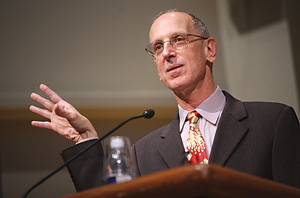“I’m all for plagiarism in its place,” said Randy Cohen at Salomon auditorium November 29. Cohen, who writes The Ethicist column in the New York Times Magazine, had been invited by the graduate school to dissect the crime of copying, and along the way he distinguished the flattery that underlies artful imitation from the deceit of academic and journalistic plagiarism.

But the rules are different in journalism and academia, he said. The public trusts reporters to get their facts right and to provide information that’s new, not copied. Similarly, he said, taking credit for someone else’s intellectual work violates the academic principles of discovery and intellectual honesty.
Cohen acknowledged that his own column has been plagiarized by a European advice columnist. He noted that his imitator didn’t rip off his answers, however—only the questions.





